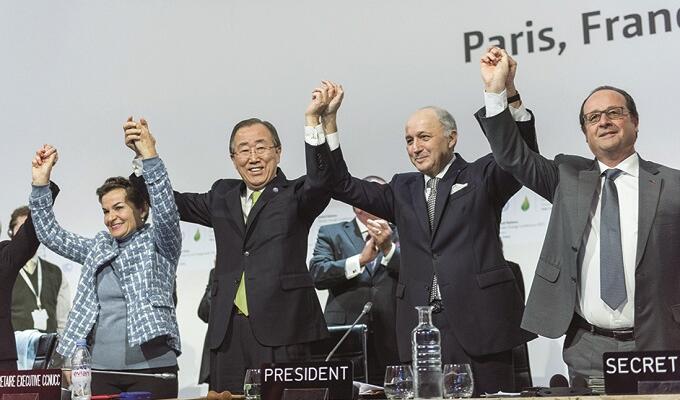

Making trade deliver for the climate
The decision at the United Nations meeting on climate change (COP21) last December to adopt the Paris Agreement marked a fundamental shift towards a new, global climate regime.
Two elements of the agreement and its implications stand out in particular. Above all was its stated ambition to keep the global average temperature ‘well below 2°C above preindustrial levels’, and to ‘pursue efforts to limit the temperature increase to 1.5°C’. This marked a considerable change compared to the global goal of 2°C previously enshrined into international climate policy.
Important, too, is the universality of the Paris Agreement. According to the final text, all parties are expected to contribute to climate action and to demonstrate their undertakings in Intended Nationally Determined Contributions (INDCs). This is another major shift from the previous regime, in which only a narrow list of predefined developed countries committed to undertake mitigation action.
Keeping temperature increases closer to 1.5°C will require tremendous efforts by governments to abate emissions and to do so quickly. Central to that goal will be a massive shift away from fossil fuels, which constitute the main cause of climate change. Similarly, the move to universality means climate-mitigation efforts will be rolled out on a much broader scale, including in countries with no previous experience in designing and implementing them and with very little guidance offered by the UN system. This suggests significant implications for the global trading system.
TRADE AND CLIMATE ACTIONTrade must therefore necessarily be part of the solution to climate change. For example, as climate change alters productive capacities for food production, trade will allow countries to secure food supplies by substituting reductions in domestic output with imports. Similarly, trade-enabled economic diversification can also build resilience to the economic impact of climate change.
Fostering the shift to clean energy technologies will require exploiting economies of scale. It will also require reducing barriers to trade to ensure that all countries, even those currently without domestic manufacturing capacity, can access the technologies at a competitive cost. As a positive side-effect, installation and maintenance of such technologies require services that are normally sourced locally, thereby generating domestic job opportunities.
The Paris Agreement acknowledges ‘the need to promote universal access to sustainable energy in developing countries, in particular in Africa, through the enhanced deployment of renewable energy’. In fact, import tariffs on certain goods, particularly those relevant for energy access, are significant in several African countries. Solar lamps, for example, attract tariffs of between 10% and 25% in many countries where access to electricity is an issue. A rather simple, unilateral tariff reform could therefore make a difference.
Enshrined in the agreement is also an emphasis on the role of technology development and transfer. It is clear that to meet the more ambitious goal of ‘well below 2°C’ there will be a need for enhanced deployment of existing mitigation technologies in addition to the development of new and improved ones, as well as for negative emissions technologies. In this area, too, there is an important role for trade to play. Competition in an open market spurs innovation and the right frameworks for trade and investment are crucial to fostering technology transfer.
One related issue still largely absent in trade and climate policymaking is that of embedded carbon. In fact, as much as onequarter of emissions are embedded in international trade of goods and services. Herein lies an important opportunity. By eventually relocating carbon intensive production and concentrating new investments in countries and regions where there is abundant access to clean sources of energy and exporting the relatively less emissions-intensive goods, it would be possible to reduce the amount of embedded carbon.
However, to reap the benefits of trade, it is crucial to get the political signals and relative prices right. Shifting to clean energy and low-emitting transport will require regulation and a carbon price that reflects the environmental cost of the associated emissions. The Paris Agreement sends a clear message that carbon pricing will be an integral part of the global mitigation effort under the new climate regime. It also opens up the process to greater cooperation, including through international carbon markets, by introducing ‘internationally transferred mitigation outcomes’. By fostering international collaboration and thus mobilising a more comprehensive response to climate change, the risks for carbon leakage can also be stemmed – an important development from a trade perspective.
CHALLENGES AHEADTrade-related challenges may become more prominent following the Paris Agreement. The move towards universality, with a wide range of policy packages being developed, adapted to the needs and capacities of each country, may lead to unintended consequences for the social and economic development, also for third countries. For instance, carbon-labelling schemes, standards or carbon taxes may all alter demand and supply of goods and services, and ultimately trade flows. Such effects need to be better understood and, when negative, minimized.
Moreover, this major scale up of climate action is likely test the limits of existing trade rules. Different subsidy schemes to clean energy, for example, have already proven contentious in the World Trade Organization (WTO). It may however not be enough to assess these schemes according to existing rules; a review of the trade framework with a view to fostering effective climate action may be necessary.
The recent trade ministerial meeting of
the WTO in Nairobi, Kenya, taking place only
one week after the pivotal climate agreement
was reached, has been seen to open up for
‘new issues’. The Paris Agreement hints that
climate change should be a priority for the
WTO and constitute one of these new issues.
Whereas some opportunities and challenges
outlined above must be addressed
multilaterally, there remains a range of actions
governments can take unilaterally or in collaboration
with small groups of countries until
the WTO is ready to move, or to go beyond
what may be feasible multilaterally. Doing
so can foster climate action and increase the
chances of the Paris agreement to deliver on
its goals. Considering the fragile if not perilous
state of the global ecosystem, that seems
a worthwhile goal.



